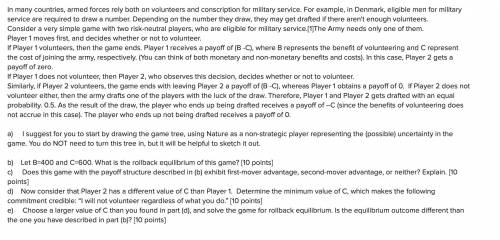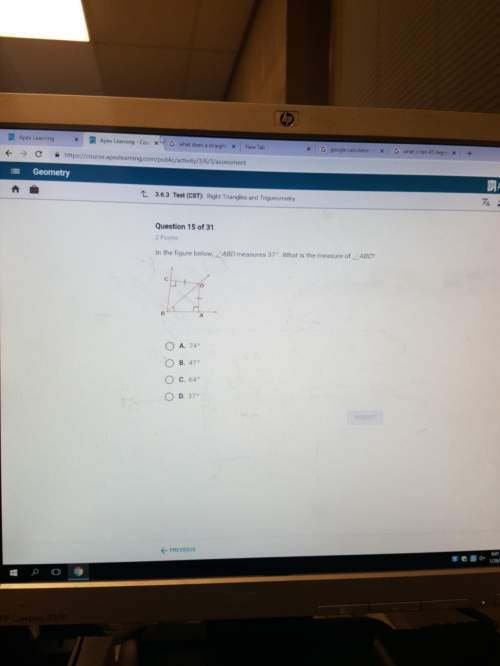GAME THEORY QUESTION -
In many countries, armed forces rely both on volunteers and conscr...

Mathematics, 08.04.2020 22:13 dshood2298
GAME THEORY QUESTION -
In many countries, armed forces rely both on volunteers and conscription for military service. For example, in Denmark, eligible men for military service are required to draw a number. Depending on the number they draw, they may get drafted if there aren't enough volunteers.
Consider a very simple game with two risk-neutral players, who are eligible for military service.[1]The Army needs only one of them.
Player 1 moves first, and decides whether or not to volunteer.
If Player 1 volunteers, then the game ends. Player 1 receives a payoff of (B -C), where B represents the benefit of volunteering and C represent the cost of joining the army, respectively. (You can think of both monetary and non-monetary benefits and costs). In this case, Player 2 gets a payoff of zero.
If Player 1 does not volunteer, then Player 2, who observes this decision, decides whether or not to volunteer.
Similarly, if Player 2 volunteers, the game ends with leaving Player 2 a payoff of (B -C), whereas Player 1 obtains a payoff of 0. If Player 2 does not volunteer either, then the army drafts one of the players with the luck of the draw. Therefore, Player 1 and Player 2 gets drafted with an equal probability. 0.5. As the result of the draw, the player who ends up being drafted receives a payoff of –C (since the benefits of volunteering does not accrue in this case). The player who ends up not being drafted receives a payoff of 0.
a) I suggest for you to start by drawing the game tree, using Nature as a non-strategic player representing the (possible) uncertainty in the game. You do NOT need to turn this tree in, but it will be helpful to sketch it out.
b) Let B=400 and C=600. What is the rollback equilibrium of this game? [10 points]
c) Does this game with the payoff structure described in (b) exhibit first-mover advantage, second-mover advantage, or neither? Explain. [10 points]
d) Now consider that Player 2 has a different value of C than Player 1. Determine the minimum value of C, which makes the following commitment credible: “I will not volunteer regardless of what you do.” [10 points]
e) Choose a larger value of C than you found in part (d), and solve the game for rollback equilibrium. Is the equilibrium outcome different than the one you have described in part (b)? [10 points]


Answers: 3


Another question on Mathematics

Mathematics, 21.06.2019 12:30
Seth practice piano for 1 1/3 hours on saturday and 5/6 hour on sunday for much longer did he practice on saturday than on sunday?
Answers: 1

Mathematics, 21.06.2019 19:30
Show your workcan a right triangle have this sides? *how to prove it without using the pythagorean theorema*
Answers: 2

Mathematics, 21.06.2019 21:30
Carl's candies has determined that a candy bar measuring 3 inches long has a z-score of +1 and a candy bar measuring 3.75 inches long has a z-score of +2. what is the standard deviation of the length of candy bars produced at carl's candies?
Answers: 1

Mathematics, 22.06.2019 00:30
Tyler reads 2/5 of a book on monday, 1/3 of it on tuesday, 2/9 of it on wednesday, and 3/4 of the remainder on thursday. if he still has 14 pages left to read on friday, how many pages are there in the book?
Answers: 3
You know the right answer?
Questions



History, 19.09.2019 04:20

Advanced Placement (AP), 19.09.2019 04:20


Biology, 19.09.2019 04:20


Engineering, 19.09.2019 04:20

English, 19.09.2019 04:20

Mathematics, 19.09.2019 04:20


Mathematics, 19.09.2019 04:20



Mathematics, 19.09.2019 04:20

Mathematics, 19.09.2019 04:20



Mathematics, 19.09.2019 04:20




